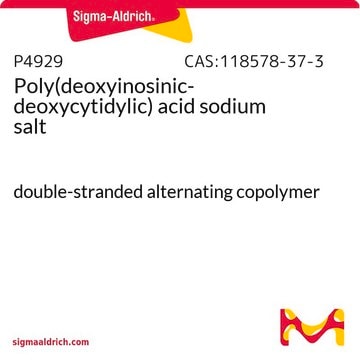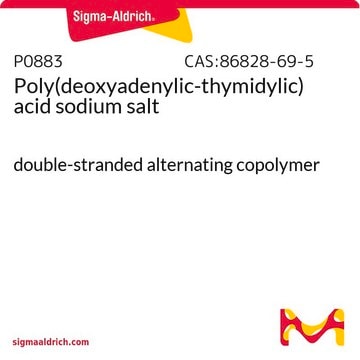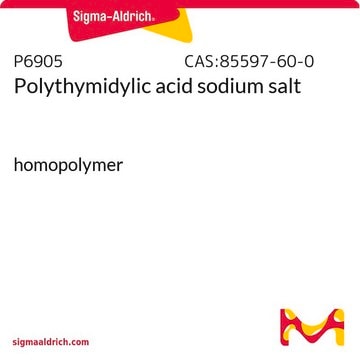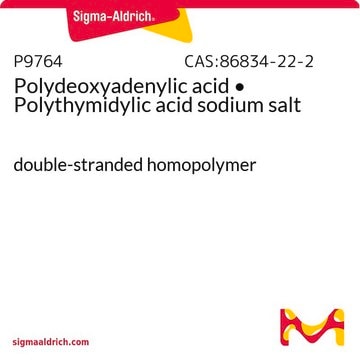81349
Poly(2′-deoxyinosinic-2′-deoxycytidylic acid) sodium salt
free from low molecular weight nucleotides, lyophilized
Synonym(s):
Poly(dI-dC) sodium salt
Sign Into View Organizational & Contract Pricing
All Photos(1)
About This Item
Recommended Products
grade
for molecular biology
form
powder
quality
lyophilized
mol wt
Mr ~2.5 × 106 (broad molecular weight distribution)
Mr ~2500000
packaging
ampule of ≥10 units A260
storage temp.
−20°C
General description
Poly (2′-deoxyinosinic-2′-deoxycytidylic acid) sodium salt is an alternating copolymer that acts as a substrate for DNA methyltransferases.
Application
Poly(2′-deoxyinosinic-2′-deoxycytidylic acid) sodium salt has been used in electrophoretic mobility shift assay (EMSA) of the transcription factor AP-2 Alpha (TFAP2A) and in southwestern blotting of human embryonic kidney cells (HEK293) nuclear extract.
Suitable for
- non-specific blocking agent in EMSA
- evaluation of DNA methyltransferases
- DNA-small molecule or drug interaction studies
Biochem/physiol Actions
Poly(2′-deoxyinosinic-2′-deoxycytidylic acid), poly(dI-dC) is a synthetic DNA substrate. At high salt, Poly(dI-dC) exists in left handed helical conformation and reverts to right-handed form upon decreasing salt. It is used as a non-specific competitor in electrophoretic mobility shift assay (EMSA).
Storage Class Code
11 - Combustible Solids
WGK
WGK 3
Flash Point(F)
Not applicable
Flash Point(C)
Not applicable
Personal Protective Equipment
dust mask type N95 (US), Eyeshields, Gloves
Certificates of Analysis (COA)
Search for Certificates of Analysis (COA) by entering the products Lot/Batch Number. Lot and Batch Numbers can be found on a product’s label following the words ‘Lot’ or ‘Batch’.
Already Own This Product?
Find documentation for the products that you have recently purchased in the Document Library.
Customers Also Viewed
Xiaomei Xu et al.
eLife, 9 (2020-08-09)
Local activation and long-range inhibition are mechanisms conserved in self-organizing systems leading to biological patterns. A number of them involve the production by the developing cell of an inhibitory morphogen, but how this cell becomes immune to self-inhibition is rather
TFAP2A is a component of the ZEB1/2 network that regulates TGFB1-induced epithelial to mesenchymal transition
Dimitrova Y, et al.
Biology Direct, 12(1), 8-8 (2017)
Repeated probing of Southwestern blots using alkaline phosphatase stripping
Jia Y, et al.
Journal of Chromatography A, 1217(45), 7177-7181 (2010)
Optimization of Competitor Poly (dI-dC) Poly (dI-dC) Levels is Advised in DNA-Protein Interaction Studies Involving Enriched Nuclear Proteins
Larouche K, et al.
Biotechniques, 20(3), 439-444 (1996)
Helical nature of poly (dl-dC). poly (dl-dC). Vibrational circular dichroism results
Wang L and Keiderling TA
Nucleic Acids Research, 21(17), 4127-4132 (1993)
Our team of scientists has experience in all areas of research including Life Science, Material Science, Chemical Synthesis, Chromatography, Analytical and many others.
Contact Technical Service
![Poly[d(I-C)] lyophilized, pkg of 10 U (10108812001 [A<sub>260</sub> units]), pkg of 50 U (11219847001 [A<sub>260</sub> units])](/deepweb/assets/sigmaaldrich/product/images/352/091/ef743cea-ccd8-44f1-8f3b-dec5a1e4f5d1/640/ef743cea-ccd8-44f1-8f3b-dec5a1e4f5d1.jpg)







